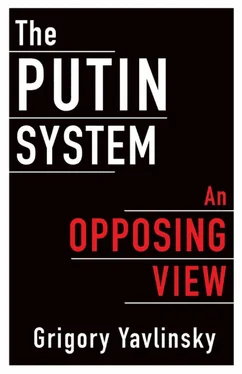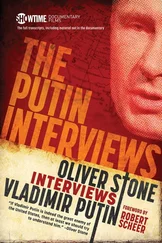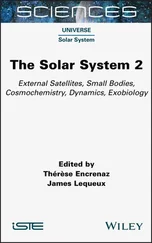peripheral authoritarianism of Russia, ill effects of: descent into parochialism, 178–81; and grotesque form of political postmodernism, 188–89; and growing unrest, 100; inability to self-adjust, 190; lack of inherent goals, 80, 84; ongoing impact of, 193; and regressive values and lifestyles, 179, 185; social deformities created by resistance to change, 157; tendency toward stagnation, 54–55, 112, 135–36; transition of social base into form characteristic of low-development countries, 116–23; and worsening of economic conditions, 182. See also corruption in Russia; demodernization of Russia; totalitarian Russian state, push toward
peripheral authoritarianism of Russia, power in: consolidation of, 14, 16, 18–19, 194, 197; control of appointments to all major posts, 65; control of elections, 33–35, 38, 40–41, 78, 79–80, 168, 199–200, 208n9; control of media and information flow, 66–67, 71–75, 133, 135; control of political parties, 78–79; elite control of economic resources, xvii, 5, 33, 40, 48, 51, 65, 104, 119, 121, 131, 133–34, 151, 194–95; perception of checks and balances as effort to undermine government, 48–49; prevention of concentration of political resources by other groups, 66, 67–71. See also vertical hierarchy of power
peripheral capitalist economies: authoritarianism as inevitable result of, 174–75, 194; ease of elite dominance of, 175; flight of talent from, 182; lower demands on governments of, 142–43; social base of near vs. distant periphery, 115–16; worsening of economic conditions and, 182
peripheral capitalist economy, Russia as, ix–xi, 4, 134–35; and antagonist relations with West, xi; attraction of West and, 105; and authoritarianism, xi, 174–75; effects of increased isolationism on, 183; elite’s difficulty accepting realities of, 182–83; and export of capital, 104–6; export of natural resources as basis of, 7, 104–5, 181, 194; high levels of corruption in, 101, 102; lost opportunity to join economic core, 184; perpetuation of, 6–7, 9; and revocable oligarchical ownership of assets, 175; as shaped by conditions of Soviet foundation, 101, 193–94; solidification of image over time, 7–8; Western sanctions and, xii; worsening of economic conditions and, 182. See also corruption in Russia
peripheral regime status, Russian resentment of: as driver of Russian policy, ix, xii–xiii; and ongoing confrontation with West, 150; and rise of anti-Western sentiments, 8, 134–35. See also West, Russian confrontation with
political freedom, assumed link to economic freedom, 11–13
political parties in authoritarian systems, 77, 210n2
political parties in Russia: government control of, 78–79; increasing irrelevance of, 166, 168–69, 199
political system in Russia, 18; fragmented power structure in post-Soviet period, 15, 16; intimidation of dissenting voices, 208n9; need for analysis of, 9–11; as peripheral authoritarianism, 16; as unchanged from early post-Soviet system, 15–16, 18–19. See also peripheral authoritarianism of Russia; totalitarian Russian state, push toward
political system in Russia, in 1990s, 30–52, 39; absence of characteristics of democracy, 52–54; Bolshevik methods of reformers, 51; conflation of patriotism and loyalty to chief of state, 38, 48; de facto continuance of Soviet bureaucratic structures, 32, 206n5; elite control of elections, 33–36, 37, 40–41; elite monopolization of resources and, 33, 40, 48, 51; elite payouts to political supporters, 38; establishment of institutionalized “successor to the president,” 39, 168; evolution into authoritarian system, 32–37, 41–42, 135–36; failure of West to productively engage, 49–51; failures of basic functions of governance, 53–54; formation of oligarchical system, 34, 38; institutions’ lack of power, 30–32, 40, 41–42; institutions’ lag behind developmental needs, 44–45; lack of consensus on organizing principles for, 32, 42–44; and lack of governability vs. true competitive system, 41–42; lack of wealthy class able to support democratic system, 46–47; misunderstanding of democracy in, 32; post-Soviet ideological crisis and, 52; reform ideology, 88; repetition of historical flaws in Russia government, 45–46; rule of law, decline of, 31–32, 40, 53; social base characteristic of near-core peripheral economies, 116–19; and Soviet destruction of propertied class, repercussions of, 46–47
political system in Russia, in 2000s, 54–63; author’s warnings about, 57; brief flirtations with responsive reforms, 59, 63; choice of stagnation-prone version of authoritarianism, 54–55, 57, 62, 135–36; corporatism, development of, 122–23; decaying effectiveness of institutions, 56; effects of stagnation-prone authoritarianism, 56; entrenchment of authoritarian government, 62–63; failure of West to productively engage, 61–62, 208–9n12; and financial crisis of 2008–09, 60; lack of government ideology, 88–90; lack of wealthy class able to support democratic system, 57–59; loss of control over events, 56; oil and gas revenues as cushion against reform pressures, 59–60; responses to 1990s failures of governance, 53–54; rule of law, decline of, 56; transition of social base into form characteristic of low-development countries, 119–23
political systems, analysis of: competition-based vs. authoritarian systems, 21; dynamic vs. static systems, 27–28. See also competition-based systems vs. authoritarian systems; terminology for political systems
Politkovskaya, Anna, 200–201
postmodernism, political: global growth of, 188; peripheral authoritarianism of Russia as, 188–89, 201
power, transfer of: in competition-based vs. authoritarian regimes, 18–19; through regular democratic means, as necessary Russian reform, 18; Yeltsin’s establishment of “successor to the president” position, 39, 168. See also elections; peripheral authoritarianism of Russia, power in
Primakov, Yevgeny, 39
private sector, Putin’s shrinking of, 207n9
progressives in West, benefits of alliances with Russian counterparts, xv, xviii–xix
property ownership: conditionality of, in ideology of Russian autocracy, 198; delegitimization by corrupt privatizations of 1990s, 38, 58, 208n10; and destruction of individual savings in hyperinflation of 1992, 27, 51; illegitimacy of, in eyes of last Soviet generation, 47–48; as issue in 1990s, 42–43; Putin’s shrinking of private sector and, 207n9
property ownership, legitimate: characteristics of, 58; need to establish, 6; Russia’s failure to establish, 189
property privatization, exclusion of sources of government’s economic power from, 69
property privatization of 1990s: and delegitimization of property ownership, 38, 208n10; and establishment of oligarchy, 34, 38, 51, 58; negative consequences of, 8
public, Russian: belief in lack of alternatives to status quo, 72–75, 135; brainwashing about threat from West, 146, 153; tacit acceptance of authoritarianism, 39, 48
public good as goal, as separate issue from form of government, 24–26
Putin, Vladimir: and castling of 2008, 63, 145; cold reception by Western leaders, 152; foreign powers’ abandonment of efforts to influence, 203; impatience with opposition viewpoints, 173; increasing autocratic power of, 173, 202; lawlessness of, in Western view, 183; as official successor to Yeltsin, 39, 168; reelection in 2004, fraud perpetrated in, 158
Putin, third presidential term of: and confrontation with West, 145–46, 152; increased Russian isolationism in, 146, 149–50, 153, 172, 173; and push toward totalitarianism, 146
Putin’s power over Russian government: and election of 2018, xvii, xviii, 203; initial consolidation within existing post-Soviet system, 18–19; Yabloko’s resistance to increase in, xviii
Читать дальше












